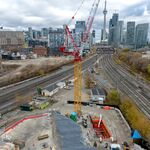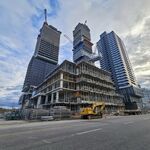innsertnamehere
Superstar
then counteract it with land use policy, The highway isn't the problem, it's crappy land use policy.
The 407 corridor was never a comprehensive land use plan or any real attempt at limiting outward growth of the GTA. It was a corridor a few hundred metres wide reserved for utilities specifically with the anticipation of rapid urban development in mind. When it was instituted in the 1970's sprawl was still considered "good" in a lot of circles, unlike today.
This does not "blow through" the greenbelt. The greenbelt policy very specifically has a part allowing for infrastructure to cross over the belt, for specific situations like this one. It services specific white belt and urban area lands designed for development.
These areas are going to be developed at a very dense level, not the 1960's-1990's sprawl we typically think of. Take a look at North Oakville and the greenfield densities going up there. 80 people and jobs a hectare is a high target to achieve.
At the end of the day as well, 80% of trips in the GTA are made by automobile, and that isn't going to change. It will start to drop, but as 100,000 people a year are added, you are probably still going to see 30,000 new cars in the GTA. Either we can let the region drown in that traffic in the name of "environmental sustainability", or you can service it in some manner. Yea, induced demand, yada yada yada, but those trips aren't going to 100% convert to transit trips no matter how hard we try. We need to try our damnest, but it doesn't make sense to ban new auto capacity projects either.
I saw a recent fact that I found very interesting - Canada already actually surpasses France on transit ridership outside of Paris, by a fairly significant margin. It's not like Canada is some auto reliant hellscape, we can always improve, but outside of the densest of the dense Asian cities, cars are an integral part of daily life anywhere in the globe. And that isn't going to change.
The 407 corridor was never a comprehensive land use plan or any real attempt at limiting outward growth of the GTA. It was a corridor a few hundred metres wide reserved for utilities specifically with the anticipation of rapid urban development in mind. When it was instituted in the 1970's sprawl was still considered "good" in a lot of circles, unlike today.
This does not "blow through" the greenbelt. The greenbelt policy very specifically has a part allowing for infrastructure to cross over the belt, for specific situations like this one. It services specific white belt and urban area lands designed for development.
These areas are going to be developed at a very dense level, not the 1960's-1990's sprawl we typically think of. Take a look at North Oakville and the greenfield densities going up there. 80 people and jobs a hectare is a high target to achieve.
At the end of the day as well, 80% of trips in the GTA are made by automobile, and that isn't going to change. It will start to drop, but as 100,000 people a year are added, you are probably still going to see 30,000 new cars in the GTA. Either we can let the region drown in that traffic in the name of "environmental sustainability", or you can service it in some manner. Yea, induced demand, yada yada yada, but those trips aren't going to 100% convert to transit trips no matter how hard we try. We need to try our damnest, but it doesn't make sense to ban new auto capacity projects either.
I saw a recent fact that I found very interesting - Canada already actually surpasses France on transit ridership outside of Paris, by a fairly significant margin. It's not like Canada is some auto reliant hellscape, we can always improve, but outside of the densest of the dense Asian cities, cars are an integral part of daily life anywhere in the globe. And that isn't going to change.






